Today Dell EMC announced an updated version of SCOS, the operating system used in the SC storage family. SCOS 7.3 is a free update and brings several new features and fixes to the table as any point release would, but in this case there’s also a major performance update as well. Due to code optimizations and a move to distributed sparing, Dell EMC has been able to secure boosts across the board. The SC9000 for instance is now capable of 2 million IOPS per array, 20 million IOPS in federated environments. All of the SC systems benefit though, with a 2X increase in all supported systems in 4K 100% read IOPS. Further there’s a boost of 50-100K mixed workload IOPS in every system (80/20 4K).
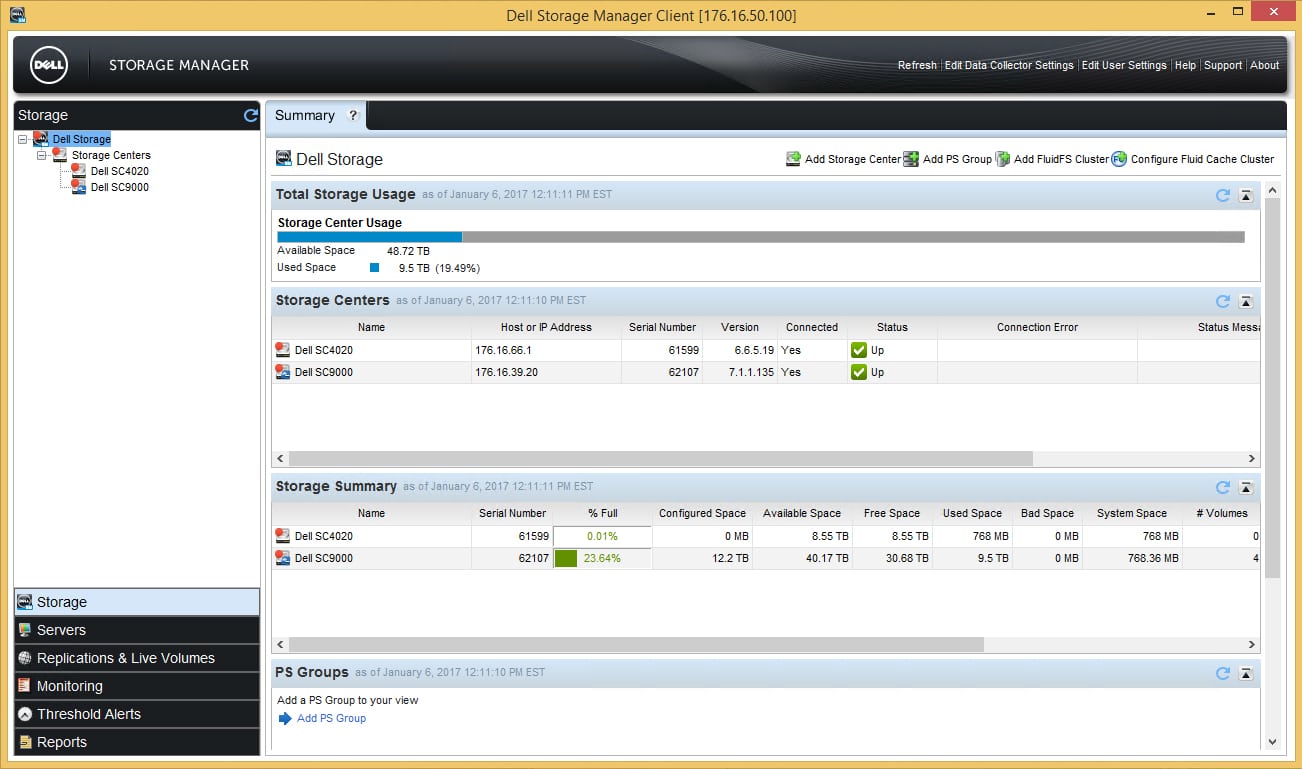
Beyond the performance gains, there are a number of other updates as part of the SCOS 7.3 release:
- CloudIQ support added – CloudIQ is a free cloud-based analytics and monitoring tool that has been used by Dell EMC Unity customers and is now available to SC storage.
- New Unisphere for SC HTML5 Web UI
- Unisphere for SC – single array management
- Unisphere Central for SC – multiple array management
- Data in place upgrades for SC4020 – Rather than replicating to a new array for upgrade purposes, customers can migrate their drives and expansion enclosures to a new head unit, saving on time and expense.
- SCv2000 now federates/replicates with other SC arrays
- Most SC systems see capacity bumps:
- SC9000 goes from 3PB to 6PB raw
- SC7020/SC7020F 3PB to 4PB
- SC5020/SC5020F 2PM to 2.16PB
- SCv3000 and prior generation models, no change
- 25GbE and 100GbE iSCSI I/O PCIe and mezzanine card support for SC5020, SC5020F, SC7020, SC7020F and SC9000
- Distributed sparing – 500% faster rebuilds and all drives are now used for I/O rather than leaving a drive idle for anticipated rebuild in the event of a drive failure.
- Live volume enhancements that offer lower latency and reduced network traffic. SCOS 7.3 also increases the number of live volume supported in the array.
For customers wanting to deploy SCOS 7.3, the firmware update is in directed availability now with general availability due in Q3 of this calendar year. As noted the update is free for customers under support contracts. SC9000, SC8000, SC7020, SC7020F, SC5020, SC5020F, SC4020, SCv3XXX and SCv2XXX models are all capable of being updated.
For the purposes of this evaluation we brought two all-flash SC5020 arrays into the lab. One SC5020 outfitted with the shipping version of SCOS 7.2, the other with a directed availability build of SCOS 7.3.
Performance
VDBench Workload Analysis
When it comes to benchmarking storage arrays, application testing is best, and synthetic testing comes in second place. While not a perfect representation of actual workloads, synthetic tests do help to baseline storage devices with a repeatability factor that makes it easy to do apples-to-apples comparison between competing solutions. These workloads offer a range of different testing profiles ranging from “four corners” tests, common database transfer size tests, as well as trace captures from different VDI environments. All of these tests leverage the common vdBench workload generator, with a scripting engine to automate and capture results over a large compute testing cluster. This allows us to repeat the same workloads across a wide range of storage devices, including flash arrays and individual storage devices. On the array side, we use our cluster of Dell PowerEdge R740xd servers.
Profiles:
- 4K Random Read: 100% Read, 128 threads, 0-120% iorate
- 4K Random Write: 100% Write, 64 threads, 0-120% iorate 6
- 4K Sequential Read: 100% Read, 16 threads, 0-120% iorate
- 64K Sequential Write: 100% Write, 8 threads, 0-120% iorate
- Synthetic Database: SQL and Oracle VDI Full Clone and Linked Clone Traces
In our first test measuring 4K random read performance, we can see the huge differential between the SC5020 running 7.3 over 7.2. 4K read performance for the system running 7.2 stayed under 1ms up until about 275k IOPS, before peaking out at 311k IOPs. The system running 7.3 though pushed out past 400k IOPS at under 1ms, and peaked at 446k IOPS.
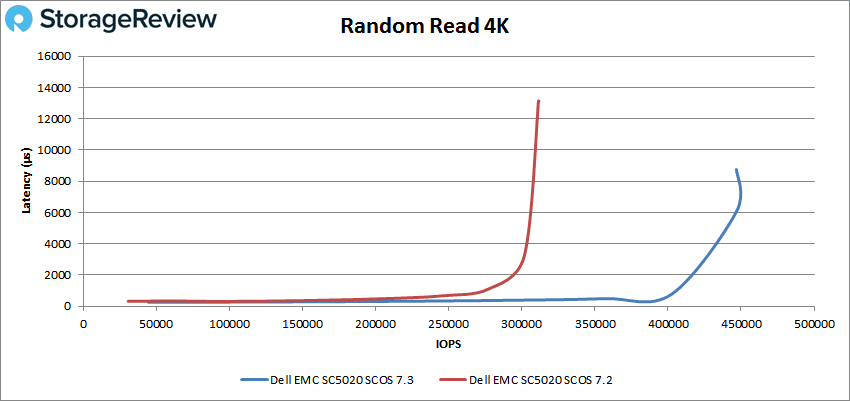
The difference between SCOS 7.2 and 7.3 couldn’t be more clear looking at 4K random write performance. The unit running 7.2 capped out at 82k IOPS, while the one running 7.3 more than doubled out to 166k IOPS.
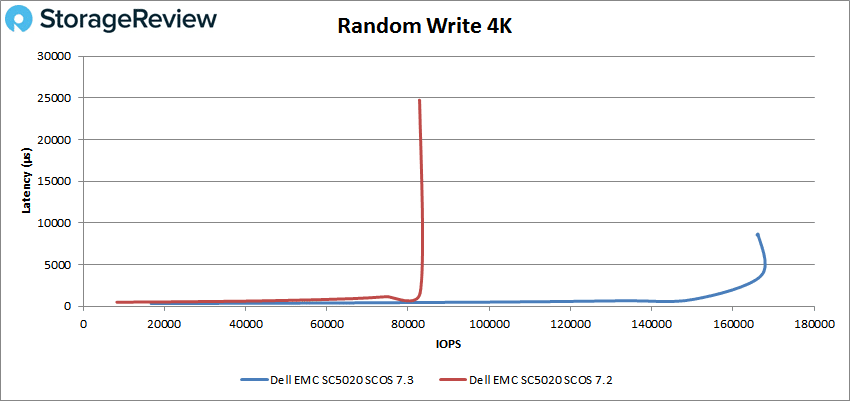
Sequential 4K performance from SCOS 7.3 continued to show strong improvements in sequential 4K rear performance, allowing the unit to push out to 1.37M IOPS, whereas the one running 7.2 measured 1.01M IOPS.
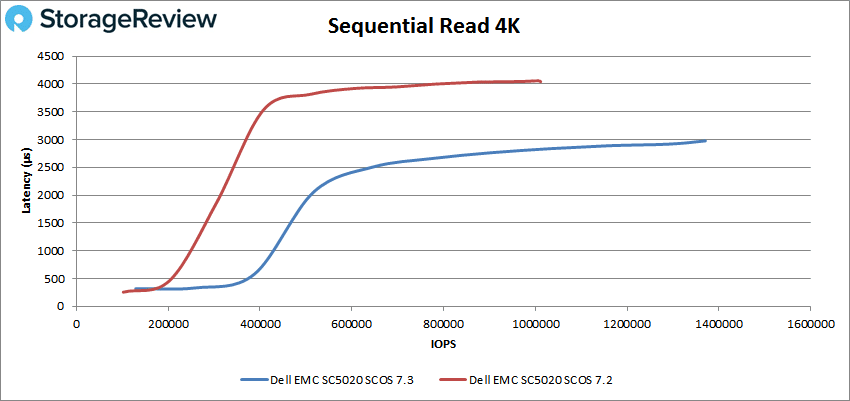
Again, in our write test measuring 4K sequential performance, we saw SCOS 7.3 push out beyond 500k IOPS, improving beyond the 326k IOPS measured from the older SCOS 7.2.
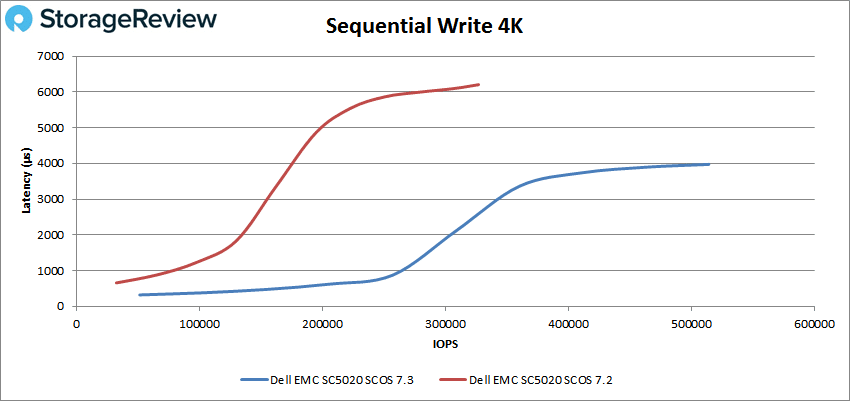
Large block sequential write performance didn’t change much, with SCOS 7.3 slipping ever so slightly against the array running 7.2. Both platforms peaked out around 10GB/s read throughput, with SCOS 7.2 having the edge on latency.
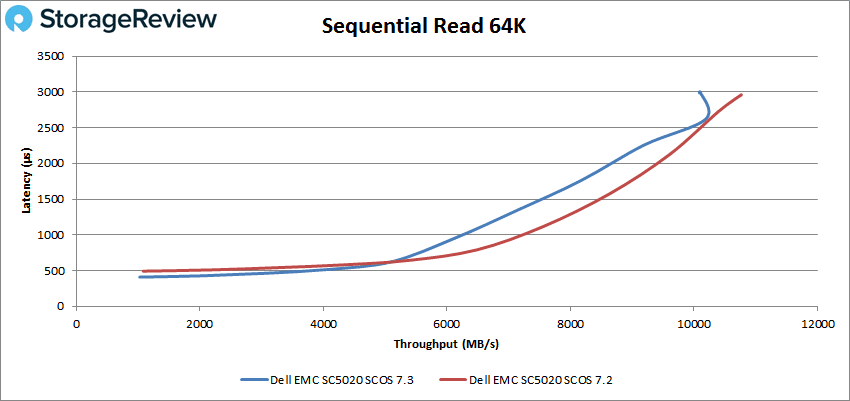
LArge block sequential write performance as measured in our 64k test saw large improvements from SCOS 7.3. At less than half the latency, SCOS 7.3 allowed the platform to push out to over 6GB/s, whereas the system running SCOS 7.2 topped out at 3.7GB/s.
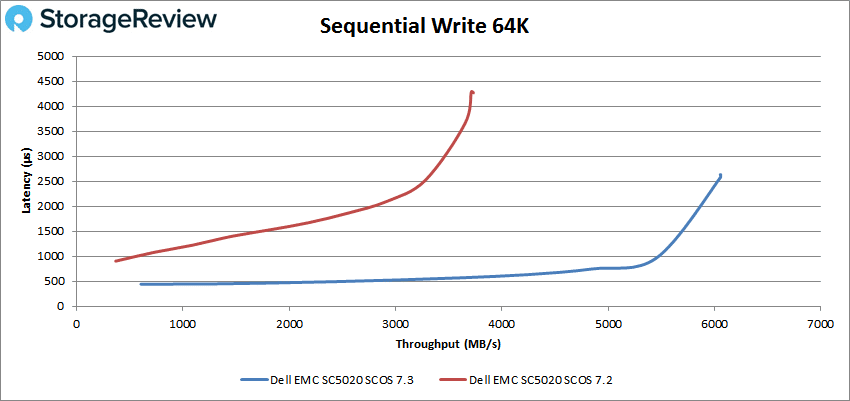
Looking at our synthetic SQL workload, SCOS 7.3 far exceeded the performance of 7.2, pulling in over 420k IOPS peak, versus 290k IOPS of SCOS 7.2.
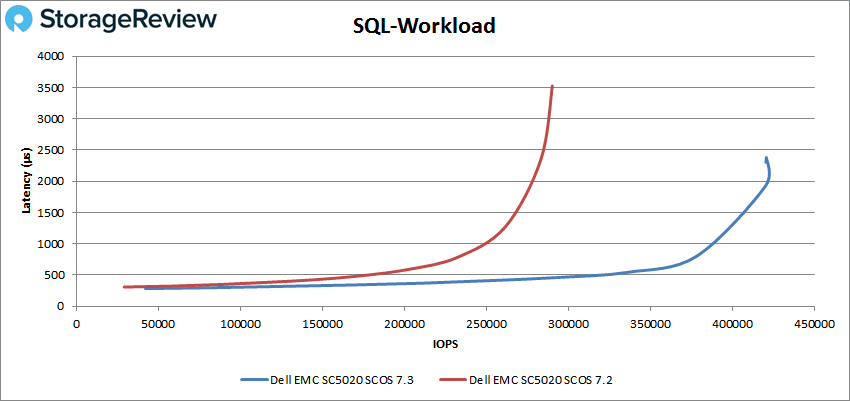
With SQL 90/10, SCOS 7.3 pulled in a peak of just under 400k IOPS, compared to 272k IOPS from SCOS 7.2.
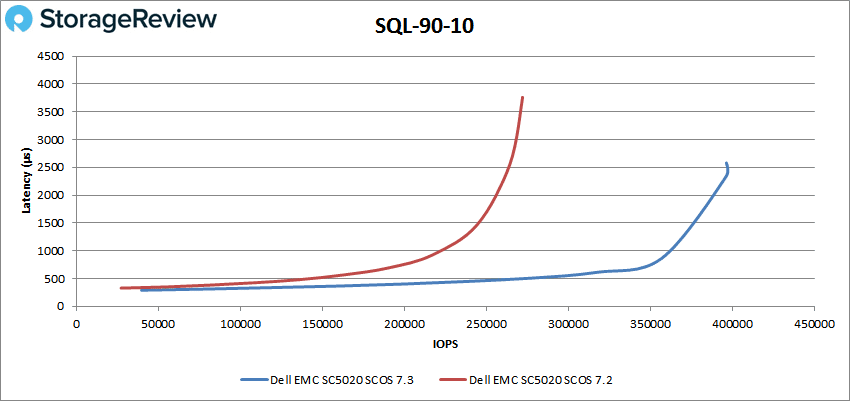
With a slightly higher write ratio in SQL 80/20, SCOS 7.3 deepened its gains over SCOS 7.2, measuring 363k IOPS peak versus 242k IOPS.
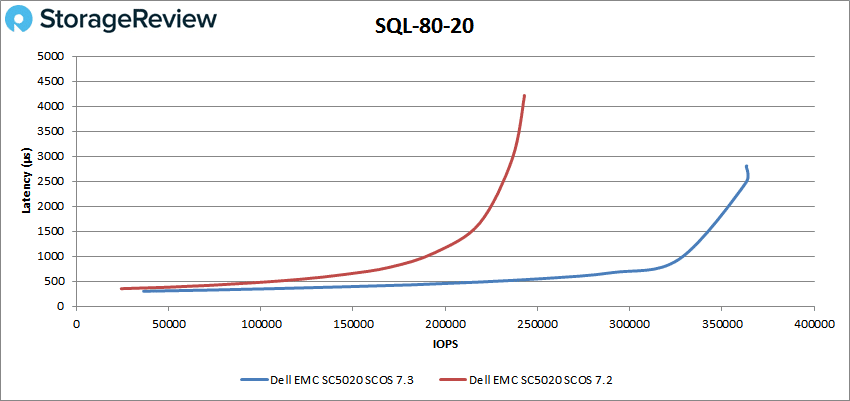
In our Oracle workload, SCOS 7.3 offered under 1ms of latency with performance up to 323k IOPS, before peaking out at 359k IOPS. SCOS 7.2 offered under 1ms latency up through 180k IOPS, before peaking at 241k IOPS.
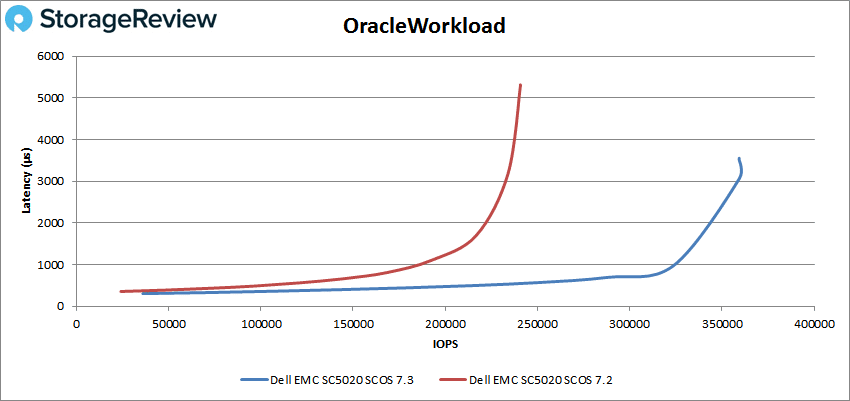
In the Oracle 90/10 workload, we measured sub-ms latency up through 370k IOPS and peak performance of 396k IOPS from SCOS 7.3. SCOS 7.2 measured around 220k IOPS at the break over 1ms of latency, before peaking at 263k IOPS.
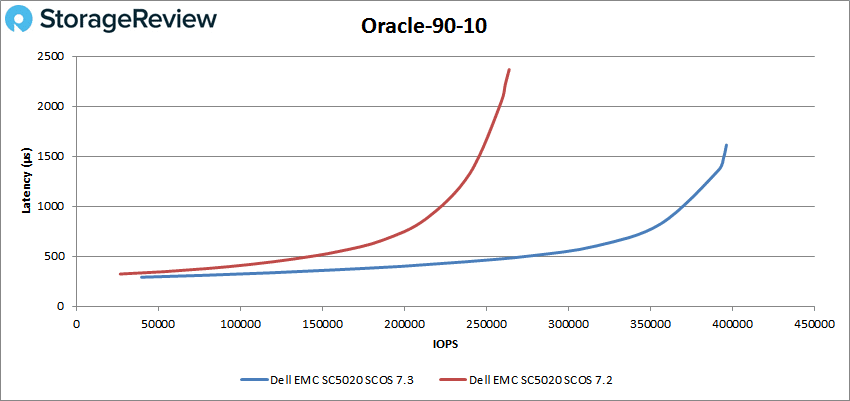
In the Oracle 80/20 test, SCOS 7.3 was able to push out to 363k IOPS at its peak, whereas SCOS 7.2 topped out at 236k IOPS.
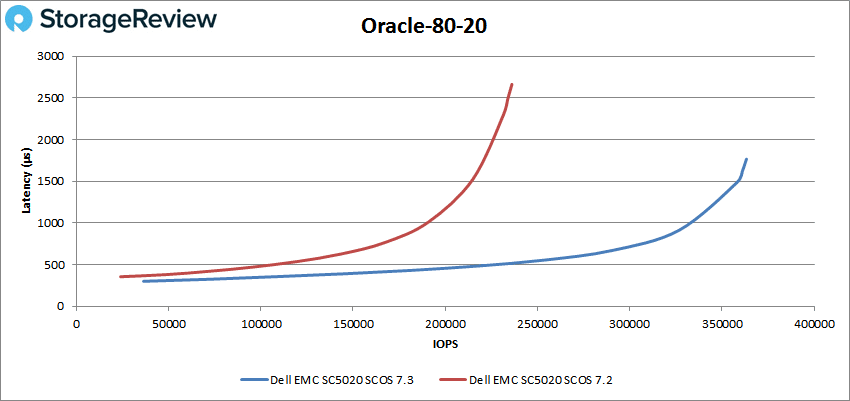
Next we look at our VDI profiles for both Full Clone and Linked Clone. For the VDI Full Clone Boot test the 7.2 version was able to peak at 269,042 IOPS with a latency of 3.84ms. After the update to 7.3, the same server was had sub-millisecond latency until about 350K IOPS and peaked at 377,413 IOPS with a latency of 27ms.
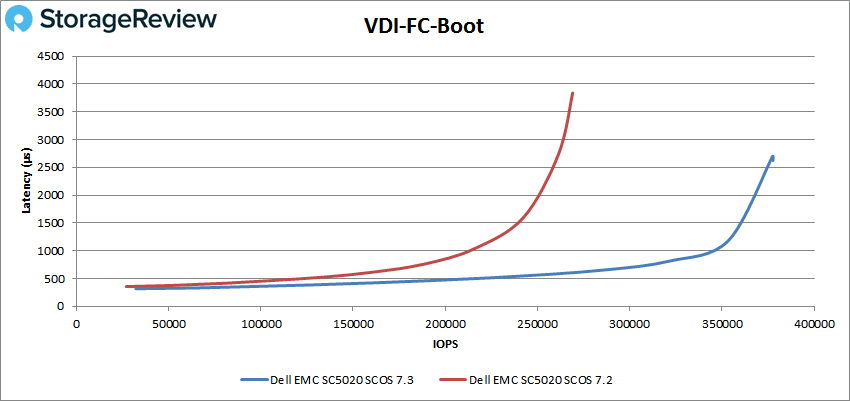
For VDI Full Clone Initial Login SCOS 7.2 hit a peak performance 116,758 IOPS with a latency of 6.8. Once the SC5020 was upgrade to 7.3 it had sub-millisecond latency up until about 140K IOPS, much higher than peak performance of the previous version. With 7.3 the SC5020 peaked at roughly 206K IOPS and a latency of 3.9ms.
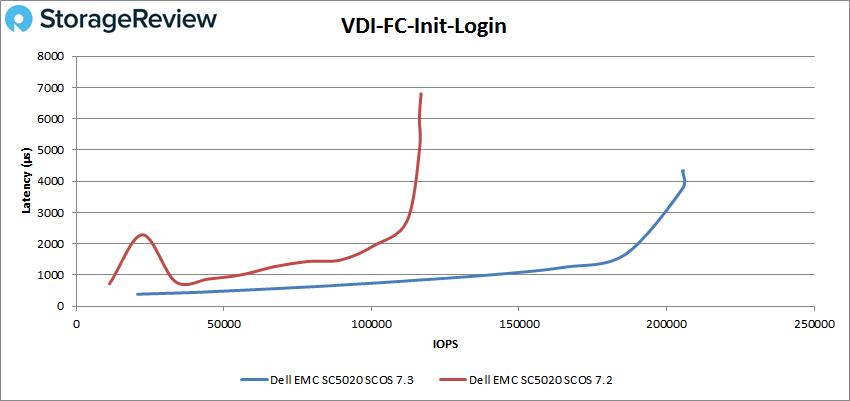
VDI Full Clone Monday Login showed the SCOS 7.2 had peak performance of 148,872 IOPS with a latency of 3.15ms. After the update the sub-millisecond latency performance was once again better than the peak performance of the previous version. The SC5020 with version 7.3 broke 1ms at 167K IOPS, again significantly higher than the previous software version’s peak performance. The SC5020 with 7.3 peaked at 240,061 and a latency of 2.13ms, nearly 100K IOPS higher than the previous peak.
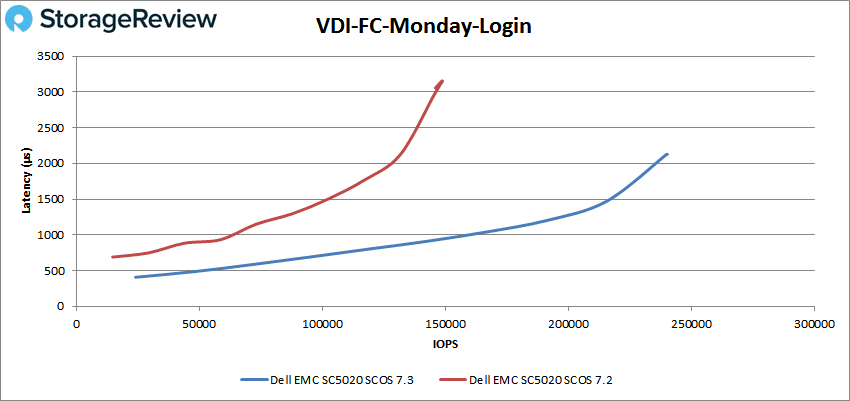
For the VDI Linked Clone benchmarks, we again start with the Boot test. Here the SCOS 7.2 had a peak performance of 267,837 IOPS with a latency of 1.85ms. When upgraded to the new 7.3 version of the software we see the performance jump up to a peak of 337,175 IOPS with a latency of 1.5ms (and the new version had sub-millisecond latency performance up to about the peak performance of the previous version).
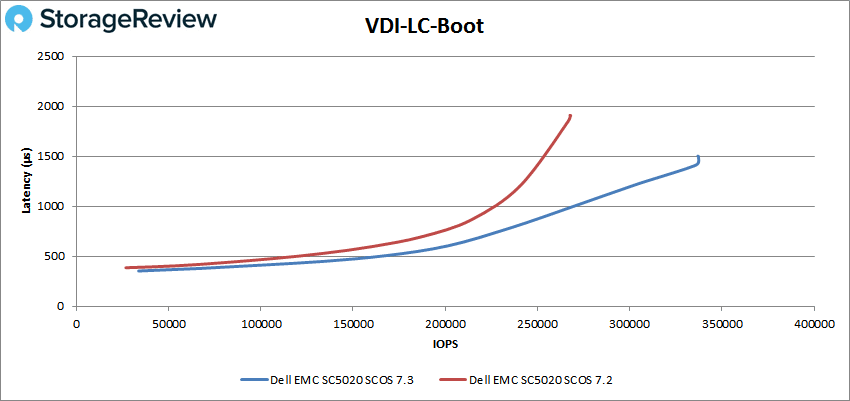
VDI Linked Clone Initial Login had the SCOS 7.2 with peak performance of 132,284 IOPS and a latency of 1.93ms. After the update there was a good performance bump and latency drop to 170,479 IOPS and 1.5ms.
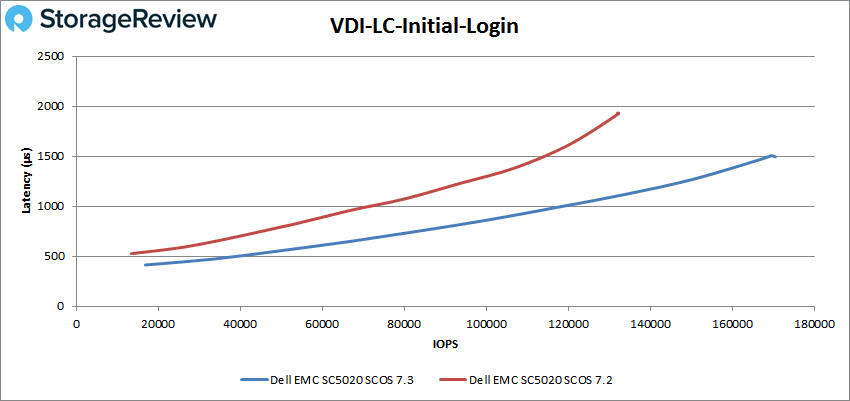
Finally we look at the difference in performance before and after the update of SCOS in our VDI Linked Clone Monday Login benchmark. Here, the 7.2 version peaked at 150,273 IOPS and a latency of 3.36ms. Again the update pushed the performance up, just not as dramatic this go around. Here the 7.3 version peaked at 198,092 IOPS with a latency of 2.58ms.
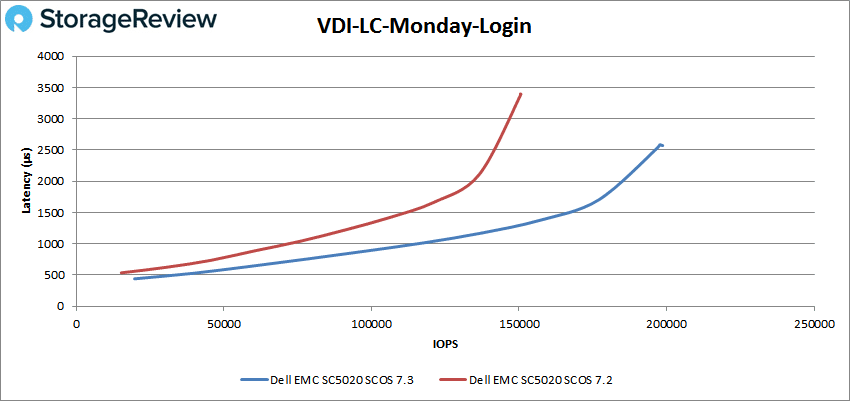
Conclusion
With performance there was an increase across the board, in some cases very dramatic. Instead of rehashing the numbers above we are going to look at some of the percentages of improvements. For the 4K random, once we upgraded we saw a 62% increase in peak performance on read and 102% increase in writes. For 4K sequential work we saw a 35.6% improvement in reads and a 53% improvement in writes. Some other notable performance improvements include 64K write (62% increase), SQL (44.8% increase), VDI FC Initial Login (77.5% increase), and VDI FC Monday Login (62% increase).
It’s clear that the Dell EMC SC engineering team did an amazing job with the SCOS 7.3 release. The pair of SC5020s we had in the lab running identical all-flash hardware, one with 7.2 and one with 7.3 code, show the clear upside of SCOS 7.3 in every single benchmark we ran. Only 64K sequential reads had performance that was largely the same, which was limited by the number of drives in our test system. The gains we saw are so dramatic that it would be easy to argue Dell EMC should have called this SCOS 8.0, making a bigger deal out of not just the performance jump but the other enhancements as well like the web UI and CloudIQ. Be that as it may, SCOS 7.3 is what they went with and Dell EMC offers the software bundle as a free upgrade to anyone on a service contract.




 Amazon
Amazon